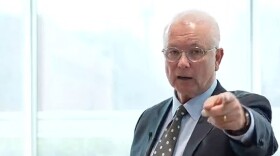Gov. Roy Cooper attended the state board of education meeting Thursday morning to share his thoughts on public school funding. Cooper, a Democrat, joined State Superintendent Catherine Truitt and Lt. Gov. Mark Robinson, both Republicans, at the head of the boardroom.
Cooper and Truitt are now in the lame-duck phase of their tenure. With Cooper reaching his term limit and Truitt having lost her primary bid this week, both will be gone by January. Meanwhile, Robinson recently won the Republican nomination for governor.
During the meeting, Cooper decried a lack of state funding for public schools by the Republican-led General Assembly.
“Unfortunately, too often, our schools are told by the legislature to do more with less,” Cooper said.
Cooper cited figures from the National Education Association’s 2023 annual report on starting teacher pay.
“Unfortunately, our beginning teacher pay has dropped to 46th in the country, 11 out of 12 in the Southeast. We're at $5,000 less per student investment than the national average,” Cooper added. “That is not the North Carolina that I know.”
Cooper criticized the legislature’s decision to expand the state’s private school voucher program — known as Opportunity Scholarships — to students of all income levels regardless of whether they have already attended a private school. The state will now provide about $3 billion over the next seven years to fund scholarships of up to $7,000 per student for private school tuition.
“Based on an analysis by the Office of State Management and Budget, our public schools could lose $200 million in state funding in just the first year of voucher expansion,” Cooper said. “That's wrong.”
Cooper said he would advocate for a moratorium on private school vouchers “until we fully fund our public schools.”
Cooper touted his own budget proposals that would have funded a comprehensive remedial plan for public schools that was ordered by state judges in the ongoing Leandro lawsuit. Judges on the case have been tasked with overseeing whether North Carolina is meeting its constitutional duty to provide a sound, basic education to all students.
Truitt, a Republican, responded with her thoughts on the comprehensive remedial plan.
“I'm going to refer back to a common trope in the political space, which is that you cannot write ‘fully funded’ on a check,” Truitt said.
Truitt listed several persistent challenges public schools are facing – difficulty recruiting teachers to rural areas, the skyrocketing costs of teachers’ health and benefits, and what she described as an outdated system for paying teachers. She said these issues are hard to solve.
“While I don't disagree that we need to spend more, it's how we spend the money that matters,” Truitt said. “And the comprehensive remedial plan is not going to get us there.”
Truitt credited recent gains in North Carolina reading scores to a law with bipartisan support that required teachers to train in using phonics to teach literacy, and she said New York, the state with the highest per-student spending in the country, hasn’t seen commensurate gains on nationally standardized tests.
Robinson rebutted Cooper’s comments on private school vouchers.
Robinson said that as he travels the state what has struck him the most is, “the amount of conversations that I've had with parents who have gotten vouchers that have literally transformed their students, their children's lives.”
The one point on which all three seemed to agree is that teacher pay is lacking.
“We have a profession in teaching that is stuck in another era, and that pays teachers like it's 1950, as though it were a secondary income for a spouse,” Truitt said.
“Our teachers in our country as a whole are one of the most undervalued assets that we have. They aren't paid well. They aren't respected, and they aren't protected,” Robinson said. “If this state's going to change anything, we've got to change that.”







